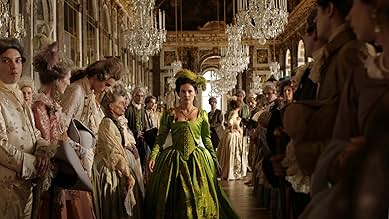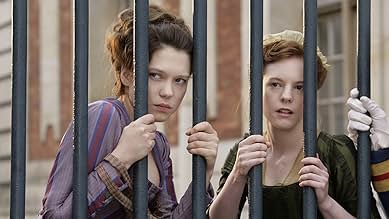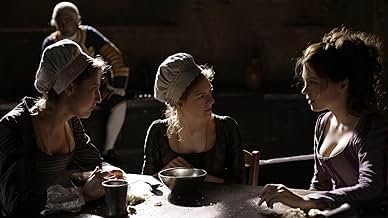AVALIAÇÃO DA IMDb
6,2/10
9,4 mil
SUA AVALIAÇÃO
Um olhar sobre a relação platônica entre Maria Antonieta e uma de suas leitoras durante os primeiros dias da Revolução Francesa.Um olhar sobre a relação platônica entre Maria Antonieta e uma de suas leitoras durante os primeiros dias da Revolução Francesa.Um olhar sobre a relação platônica entre Maria Antonieta e uma de suas leitoras durante os primeiros dias da Revolução Francesa.
- Direção
- Roteiristas
- Artistas
- Prêmios
- 6 vitórias e 12 indicações no total
Julie-Marie Parmentier
- La servante Honorine Aubert
- (as Julie-Marie Parmentier de la Comédie Française)
Marthe Guérin Caufman
- La domestique Alice
- (as Marthe Caufman)
Hervé Pierre
- L'abbé Hérissé
- (as Hervé Pierre de La Comédie Française)
- Direção
- Roteiristas
- Elenco e equipe completos
- Produção, bilheteria e muito mais no IMDbPro
Avaliações em destaque
I love a good costume drama, but anything that includes Marie-Antoinette is apparently bound to be a repetition of the same old clichés over and over.
We get it, she was completely disconnected from reality, careless and pampered and bored and tended to for every bit a normal human being does itself. Age-old cliché that Marie-Antoinette was nothing more than a self-absorbed bimbo? Check.
We get it also, the French Revolution was an immense shock to the royalty and aristocracy; not only did they not see it coming, they didn't think it was possible at all to see the end of their reign. Again, the tried-and-true representation of 18th century French aristocrats as clueless morons? Check.
So, after reinstating the same backdrop again (and again), this version puts forth a bigger focus on rumours of a lesbian love affair the queen was accused of having back then, because that would make the movie so unique.. or not. The story was already a snorefest on paper so let's toss in some sexual material to spice it up in spite of one's better judgement? Check.
The list goes on.
The photo direction is beautiful, the costumes and decors are gorgeous, the actors are all excellent, all this movie is missing is an actual story worthy of your attention. A real shame.
We get it, she was completely disconnected from reality, careless and pampered and bored and tended to for every bit a normal human being does itself. Age-old cliché that Marie-Antoinette was nothing more than a self-absorbed bimbo? Check.
We get it also, the French Revolution was an immense shock to the royalty and aristocracy; not only did they not see it coming, they didn't think it was possible at all to see the end of their reign. Again, the tried-and-true representation of 18th century French aristocrats as clueless morons? Check.
So, after reinstating the same backdrop again (and again), this version puts forth a bigger focus on rumours of a lesbian love affair the queen was accused of having back then, because that would make the movie so unique.. or not. The story was already a snorefest on paper so let's toss in some sexual material to spice it up in spite of one's better judgement? Check.
The list goes on.
The photo direction is beautiful, the costumes and decors are gorgeous, the actors are all excellent, all this movie is missing is an actual story worthy of your attention. A real shame.
This is a modern historical drama. Characters are not well-developed, and their motivations are not clear. Why is Sidonie so devoted to the Queen? Why does she suddenly want to have sex with the gondolier? Instead, there is LOTS of atmosphere, which makes for one slow film.
You won't learn much about what actually happened in the week that followed the fall of the Bastille, since the story, to the extent that there is a story, is told through the eyes of one of the Queen's domestics. (It does remind you that, in a day not only before computers and the internet, but even television and radio, you could live 30 miles away from momentous events and have no idea what was going on.) Nor will you learn much about Marie-Antoinette or Louis XVI. The latter is a minor character here. MA comes off as very capricious, which she evidently was. But why? Again, there is no character development.
And then, finally, the movie stops, and you go "Oh, is it over?" As I said, LOTS of atmosphere. If that floats your boat, you might like this movie.
It did nothing for me, and I'm very interested in French history.
You won't learn much about what actually happened in the week that followed the fall of the Bastille, since the story, to the extent that there is a story, is told through the eyes of one of the Queen's domestics. (It does remind you that, in a day not only before computers and the internet, but even television and radio, you could live 30 miles away from momentous events and have no idea what was going on.) Nor will you learn much about Marie-Antoinette or Louis XVI. The latter is a minor character here. MA comes off as very capricious, which she evidently was. But why? Again, there is no character development.
And then, finally, the movie stops, and you go "Oh, is it over?" As I said, LOTS of atmosphere. If that floats your boat, you might like this movie.
It did nothing for me, and I'm very interested in French history.
A marvelous film. Very rarely does a film based on fact, especially a story as infamous as this one, succeed at creating such tension despite the fact that everyone knows pretty much what is going on and what will happen (United 93 springs to mind). As it is director Benoît Jacquot and his team have done a incredible job in capturing the confusion, uncertainty and pure dread that those living at Versailles in the final days of the Monarchy must have felt. Seriously, anyone who's ever dismissed period dramas and films based on true stories as "stuffy", slow and boring should give this one a shot. The cast is also exceptionally strong, led by a group of immensely talented female performers. The only downside is really the ending, unfortunately, slightly anticlimactic and a bit of a let down.
For the next few years, it must be assumed that any film featuring a popular uprising will attract lazy comparisons to the Arab Spring. The wild waters of revolution run swift in Benoit Jacquot's "Farewell, My Queen", set in the days of July, 1789. Over a wet week in France, starving Parisians storm the symbol of state tyranny, the Bastille, seizing guns and ammunition. Protesters issue a list of demands, calling for the beheadings of nearly 300 influential figures. The de facto signs of regime change are everywhere. Dead rats float in the Grand Canal in Versaille; mosquitoes terrorize the members of the Royal household. Marie Antoinette (Diane Kruger), the Queen of France, however, has escapism on her mind – she sits in bed, skim-reading the latest fashion pages.
In this task, she is aided by a number of ladies-in-waiting and her reader, Sidonie Laborde (Lea Seydoux). The young woman is called to run to the palace library and return with books and plays she reads aloud to the queen. We learn she is a member of the queen's inner circle and somewhat infatuated with her employer. She performs her duties with a mixture of fear, envy and respect. When the stench of revolution is impossible to ignore, she is told she will be guided to safety. Understandably, she feels more than a little betrayed when the queen orders her to impersonate a fleeing aristocrat, Gabrielle de Polignac, who will accompany her, dressed as a servant. If she is captured, Laborde risks death, while Polignac will abscond to safety.
This could all be familiar territory – Sofia Coppola's "Marie Antoinette" (2006) took a distinctly sweet-toothed approach to the French Revolution, imprisoning Kirsten Dunst behind tiers of artisan cakes. In Coppola's film, the French royals behaved like party-goers on an episode of MTV's "My Super Sweet 16". "Farewell, My Queen", which is based on a novel by Chantal Thomas, isn't confection of the same variety. This dimly lit and low budget film marks the end of the fantasy world of Versailles, its gilded halls, jeweled furniture and costumed courtiers. The Royal staff bow and curtsy at every available opportunity – in their spare time, they trade gossip about the private indiscretions of their employers and idly speculate the future of post-revolutionary France.
Unfortunately, the inner workings of the court of Versailles simply aren't any match for the layered politics that define teenage life on "My Super Sweet 16". While Coppola's film was candy floss masquerading as history, "Farewell, My Queen" succeeds in laboring every aspect of daily life at the Royal court. We are told, time and time again, there lurks intrigue behind every palace wall – most of it remains frustratingly off screen. At one point, I found myself thinking Laborde's chores were no different from the experiences of any gap year student – and considerably less hedonistic.
The end, when it arrives, is all too predictable. As members of the royal household are attacked on the streets of Paris, the occupants of Versaille decide to flee. As the royals leave for the last time, their carriages bursting with furniture and jewels, the staff is told "the King will now check the temperature of the throne room". Ice-cold, I would imagine. Not unlike Jacquot's French revolution.
In this task, she is aided by a number of ladies-in-waiting and her reader, Sidonie Laborde (Lea Seydoux). The young woman is called to run to the palace library and return with books and plays she reads aloud to the queen. We learn she is a member of the queen's inner circle and somewhat infatuated with her employer. She performs her duties with a mixture of fear, envy and respect. When the stench of revolution is impossible to ignore, she is told she will be guided to safety. Understandably, she feels more than a little betrayed when the queen orders her to impersonate a fleeing aristocrat, Gabrielle de Polignac, who will accompany her, dressed as a servant. If she is captured, Laborde risks death, while Polignac will abscond to safety.
This could all be familiar territory – Sofia Coppola's "Marie Antoinette" (2006) took a distinctly sweet-toothed approach to the French Revolution, imprisoning Kirsten Dunst behind tiers of artisan cakes. In Coppola's film, the French royals behaved like party-goers on an episode of MTV's "My Super Sweet 16". "Farewell, My Queen", which is based on a novel by Chantal Thomas, isn't confection of the same variety. This dimly lit and low budget film marks the end of the fantasy world of Versailles, its gilded halls, jeweled furniture and costumed courtiers. The Royal staff bow and curtsy at every available opportunity – in their spare time, they trade gossip about the private indiscretions of their employers and idly speculate the future of post-revolutionary France.
Unfortunately, the inner workings of the court of Versailles simply aren't any match for the layered politics that define teenage life on "My Super Sweet 16". While Coppola's film was candy floss masquerading as history, "Farewell, My Queen" succeeds in laboring every aspect of daily life at the Royal court. We are told, time and time again, there lurks intrigue behind every palace wall – most of it remains frustratingly off screen. At one point, I found myself thinking Laborde's chores were no different from the experiences of any gap year student – and considerably less hedonistic.
The end, when it arrives, is all too predictable. As members of the royal household are attacked on the streets of Paris, the occupants of Versaille decide to flee. As the royals leave for the last time, their carriages bursting with furniture and jewels, the staff is told "the King will now check the temperature of the throne room". Ice-cold, I would imagine. Not unlike Jacquot's French revolution.
It's July, 1789, and French citizenry is starting to revolt. Queen Marie Antoninette (Diane Kruger) is hold up at Château de Versailles with her court and her book reader (Léa Seydoux). When the news of the storming of the Bastille reaches them, panic sets in and the King's entourage start slipping away.
It's fascinating to see the various reaction as rumors start to spread. Léa Seydoux is great as the doe-eyed true believer. It is disconcerting to know her true naivety even though she has no idea. It's the source of the tension, but it's also infuriating. Diane Kruger is fine, but I thought that it wasn't quite big enough. However, the climax was just right.
It's fascinating to see the various reaction as rumors start to spread. Léa Seydoux is great as the doe-eyed true believer. It is disconcerting to know her true naivety even though she has no idea. It's the source of the tension, but it's also infuriating. Diane Kruger is fine, but I thought that it wasn't quite big enough. However, the climax was just right.
Você sabia?
- CuriosidadesIn this movie, Diane Kruger speaks French with a German/Austrian accent - which is undoubtedly how the Austrian-born Marie Antoinette would have spoken herself.
- Erros de gravaçãoOn several occasions when soldiers are marching through the main and side gates of Versailles, and also when Sidonie goes to Le Petite Trianon for the first time and falls into a puddle, you can clearly see the very 21st century anti-terrorism concrete security barriers and bollards flanking the gates.
- Citações
Agathe-Sidonie Laborde: In a way, Your Majesty, you're asking me to go as bait.
La reine Marie Antoinette: An ugly word for a pretty mouth!
Agathe-Sidonie Laborde: Words are all I possess. I wield them well.
- ConexõesReferenced in Parole de cinéaste: Benoît Jacquot (2017)
Principais escolhas
Faça login para avaliar e ver a lista de recomendações personalizadas
- How long is Farewell, My Queen?Fornecido pela Alexa
Detalhes
- Data de lançamento
- Países de origem
- Centrais de atendimento oficiais
- Idiomas
- Também conhecido como
- Farewell, My Queen
- Locações de filme
- Empresas de produção
- Consulte mais créditos da empresa na IMDbPro
Bilheteria
- Faturamento bruto nos EUA e Canadá
- US$ 1.597.998
- Fim de semana de estreia nos EUA e Canadá
- US$ 72.100
- 15 de jul. de 2012
- Faturamento bruto mundial
- US$ 6.366.835
- Tempo de duração1 hora 40 minutos
- Cor
- Mixagem de som
- Proporção
- 2.35 : 1
Contribua para esta página
Sugerir uma alteração ou adicionar conteúdo ausente

Principal brecha
By what name was Adeus, Minha Rainha (2012) officially released in India in English?
Responda

































